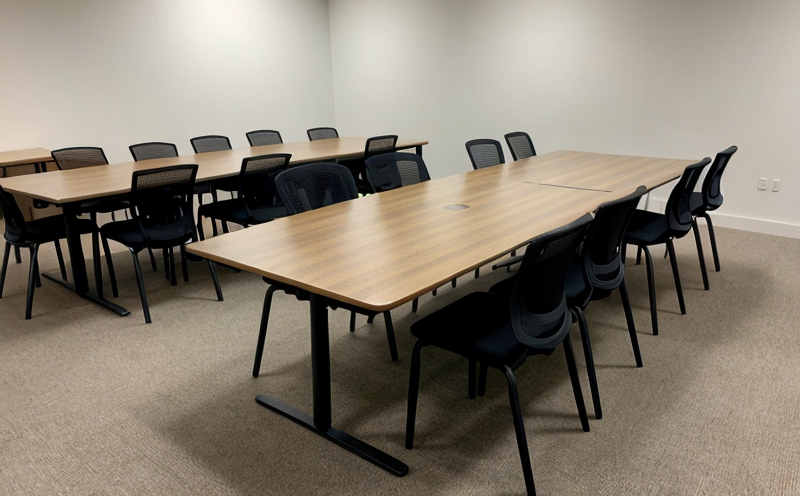DIN EN 12722 Assessment of Resistance to Dry Heat for Tables Testing
The DIN EN 12722 standard is a crucial document in the furniture testing sector, specifically tailored for assessing the resistance of tables and desks to dry heat. This standard ensures that manufacturers can provide durable and reliable products capable of withstanding environmental stressors without compromising safety or performance.
Under this standard, tests are conducted to evaluate how various components of a table—such as wood, metal, plastic, and composite materials—are affected by prolonged exposure to high temperatures. The primary objective is to determine if the table can maintain its structural integrity and functional properties after being subjected to dry heat conditions.
The process involves exposing specimens cut from the actual product under controlled laboratory conditions, where temperature and humidity are precisely regulated. After a specified duration of exposure (typically 12 hours), the samples undergo visual inspection followed by mechanical testing to assess any changes in dimensions, appearance, or functionality. Compliance with this standard is essential for manufacturers aiming to meet international quality standards and ensure consumer safety.
For wood-based materials used in table construction, this test helps identify potential issues such as warping, cracking, or discoloration that might occur due to excessive heat exposure. For metal components like legs or frames, the focus is on checking for any signs of corrosion or deformation under elevated temperatures. Plastic and composite materials are also evaluated based on their resistance to thermal degradation.
The results from these assessments provide valuable insights into a manufacturer’s ability to produce high-quality furniture that meets both aesthetic and functional requirements. By adhering to DIN EN 12722, companies can enhance their reputation for producing reliable products while also ensuring compliance with relevant regulations across different markets.
- Wood
- Metal
- Plastic
- Composite Materials
Frequently Asked Questions
What does DIN EN 12722 specifically assess?
DIN EN 12722 evaluates the resistance of tables and desks to dry heat. This includes checking for any changes in dimensions, appearance, or functionality after prolonged exposure to high temperatures.
Who should consider this test?
Quality managers, compliance officers, R&D engineers, and procurement teams involved in furniture manufacturing and design would benefit from understanding this test method. It ensures that products meet international standards for durability and safety.
What materials are typically tested?
The standard primarily tests wood, metal, plastic, and composite materials used in table construction. Each material is evaluated based on its specific properties and how they respond to dry heat.
How long does the test usually take?
The typical duration for a DIN EN 12722 assessment is 12 hours. During this time, specimens are exposed to controlled environmental conditions designed to simulate real-world scenarios involving prolonged dry heat.
What kind of equipment is used?
Advanced laboratory equipment capable of maintaining precise temperature and humidity levels is utilized. This includes ovens, environmental chambers, and specialized test fixtures tailored to the specific materials being evaluated.
What are some key outcomes?
Key outcomes include identifying any structural or aesthetic issues resulting from dry heat exposure. These findings help manufacturers improve product design and manufacturing processes to enhance overall quality.
How often should the test be performed?
Regular testing, typically conducted during initial development stages and periodically throughout production cycles, ensures continuous compliance with international standards. This helps maintain consistent product quality over time.
Are there any industry-specific applications?
Yes, this test is particularly important for commercial and office furniture manufacturers who need to ensure their products can withstand harsh environmental conditions in various settings. It also applies to residential furniture makers concerned about long-term durability.





